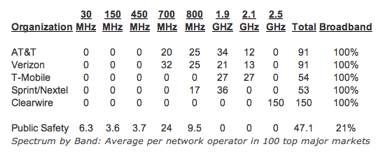Andrew Seybold: "FCC (Public Safety) Spectrum Plan Based on Faulty Logic"

He thinks the PS problem is more about spectrum than it is about money and feels FCC is focusing too much on the money issues. He points out in the following table, that all of public safety has less spectrum than any of the big carriers:
Here is a typical statement from Mr. Seybold:
The FCC’s tenor when discussing the NBP report with the public safety community[4] appears to be that if the public safety community wants FCC support for funding the network build-out, it needs to accept the rest of the FCC’s recommendations in the NBP report.
The public safety community has responded that the funding is immaterial without enough broadband spectrum to build out the network and has concentrated on pointing out the need for additional spectrum, the willingness of commercial operators to work with public safety, and the fact that even the funding model used by the FCC is flawed.
...
In the body of this paper, we will prove that the entire FCC white paper is based on faulty and unsupported logic.
Apparently, you can’t please all the people all the time!




![Validate my RSS feed [Valid RSS]](valid-rss-rogers.png)

